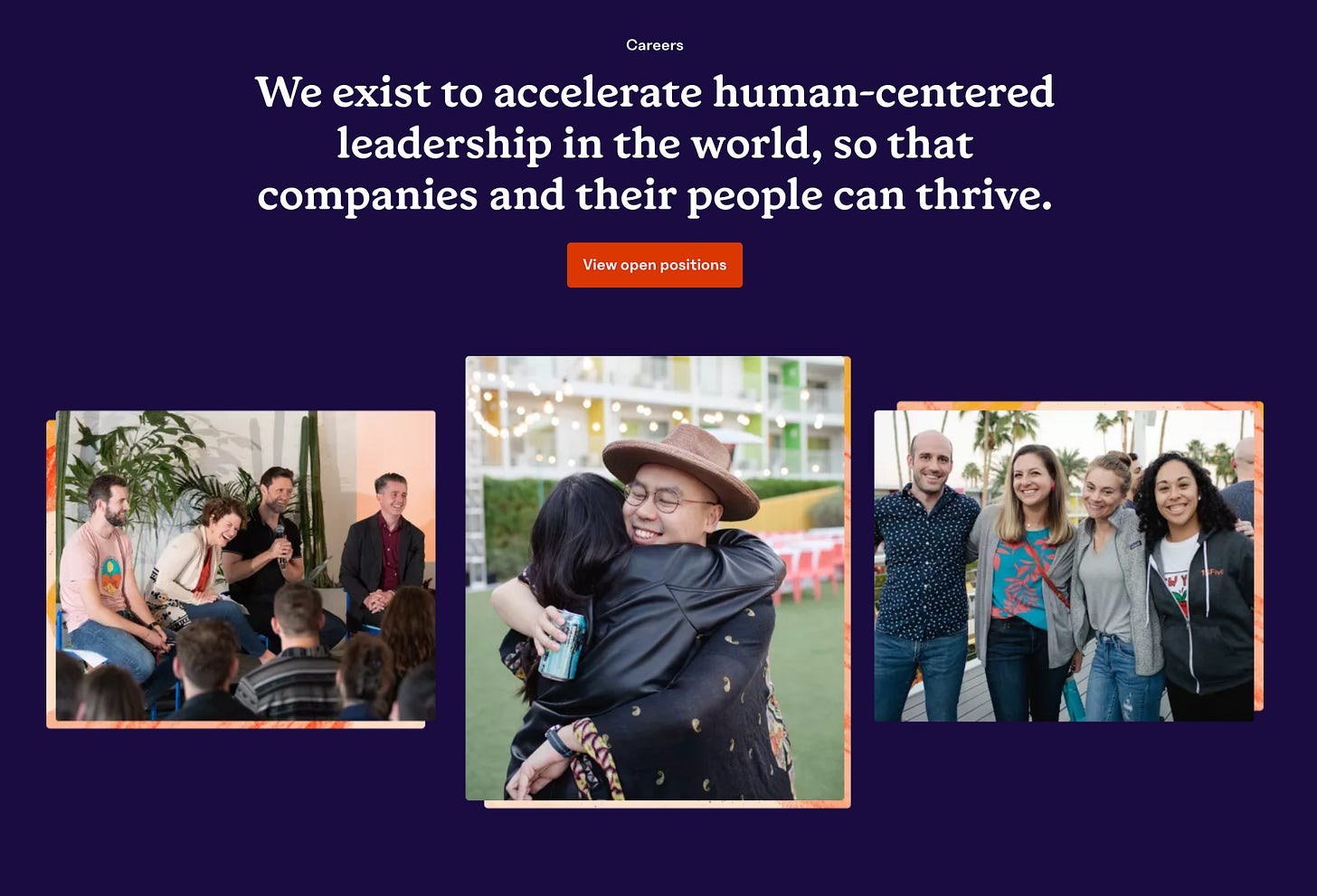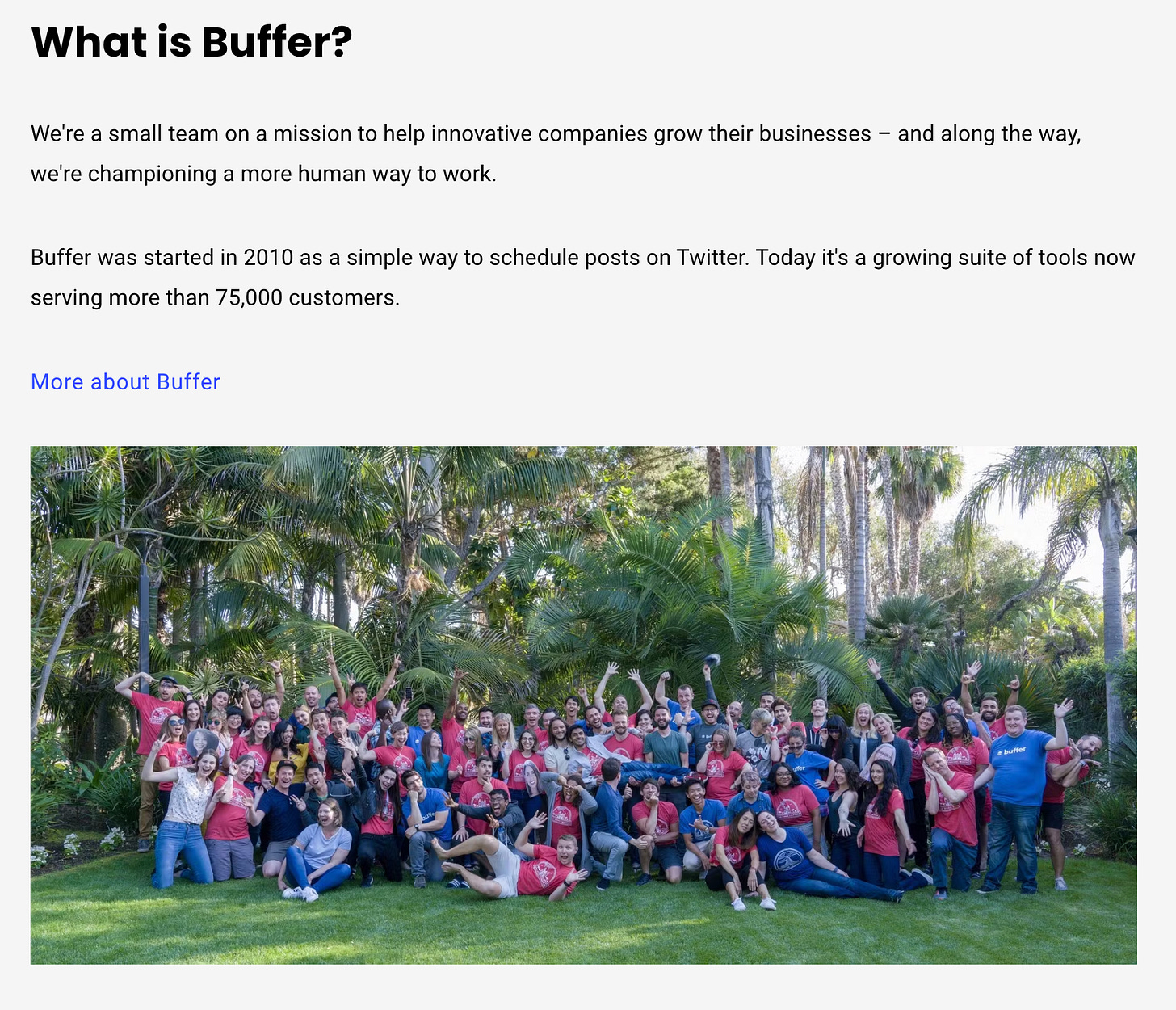The "Employer Marketing" Benefits of Offsites: How To Leverage Team Retreats To Hire and Retain Top Talent
While employer marketing isn't the main reason you should plan offsites, NOT maximizing the recruiting benefits of offsites means leaving money on the table.
Welcome to The Offsite Blog, for those of you who are new here in 2024.
Sorry for not publishing more frequently as of late. For some reason, I’ve gone “viral” on LinkedIn the last 3 weeks (with over 4.5M impressions), so I’ve been wrapped up in generating content there and keeping up with notifications, messages, and emails.
If you’d like to see my posts on LinkedIn, please follow me and hit the notification bell. I’m posting daily between 8:00 - 10:00am EST.
However, I should be back to writing 1x/week for The Offsite Blog, so thanks for your patience. If you have any templates, resources, or content requests, please email me at jared@offsite.com.
With that, let’s get into today’s post.
Thanks. - Jared
Positive company culture is about as important a consideration as salary for most knowledge workers when taking a new job.
For remote or hybrid companies, offsites have emerged as foundational building blocks for culture. This means that your offsite strategy is not only critical for increasing employee engagement, retention, and alignment, but offsites present a golden opportunity for employer branding as well.
If you plan regular offsites (and promote them afterwards), you can generate further ROI for your team retreats by leveraging them for recruiting top talent. In turn, these new employees will then attend your offsites and stay at your company for longer with increased engagement.
And thus, a virtuous cycle is created.
Here are ideas for maximizing the “employer marketing” potential of your offsites.
1. Share Photos and Videos On Your “Careers” Page
Simple, but effective.
Capture candid moments, team activities, and picturesque retreat locales. Highlight these on your Careers page to give potential candidates a look into your company’s culture. Remember, authenticity resonates; staged photos lack the warmth of genuine team interactions and won’t sell someone as much as “real” photos of your offsites.
Our clients 15Five (above) and Buffer (below) do a great job of incorporating photos from their offsites on their company’s Careers pages.
For another example, you can view Offsite’s website to see various videos from our team retreats in Austin, TX and upstate New York.
A picture is worth a thousand words, and videos are worth a million. Instead of saying you have a diverse or energetic team (for example), let candidates see it in action.
2. Mention Team Retreats As A Perk on Job Descriptions
On every job description, list your various perks (which may include things like being remote or hybrid, offering 401k plans, and providing unlimited PTO).
Add “annual team retreats” or “regular”/”quarterly” retreats depending on your offsite cadence and let people know they’ll have company-sponsored travel when they join your team.
For a majority Millennial and Gen-Z workforce, the ability to travel on company cash is a huge plus. Retreats also show your commitment to providing the flexibility of remote-first work, with the human connection we all crave that offsites provide in absence of an office environment.
3. Post About Offsites On Company Social Media Accounts
Utilize platforms like Instagram, LinkedIn, and Twitter to broadcast your offsite experiences. Create moments during your offsite that employees will be eager to share — think fun group challenges, scenic backdrops, and insightful workshop snippets.
When employees share these experiences on their own personal accounts, they are actively endorsing your company as a great place to work, and telling the story that your company provides a workplace they’re proud to be part of.
Again, some of our clients recently shared their offsites on LinkedIn. SchoolStatus (above) held their Sales Kickoff (SKO) last week in Atlanta and posted a recap video that has been liked, commented on, and shared by team members.
A few months back, Socium Media (below) posted daily content during their team retreat for folks to follow along.
4. Write Blog Posts About Your Team Retreats
For similar reasons as #3, blog posts allow candidates to learn more about your company’s culture through a detailed overview of past team retreats.
What’s important to you and your company? Why do you decide on certain cities, activities, and goals for your offsites? You can articulate these ideas and values in recap blog posts.
Buffer is a dream client for me because I started Offsite (in part) due to their offsite strategy over 10 years ago. They’ve been remote-first “before it was cool” and wrote some content marketing pieces around offsites including this one and this one.
Undoubtedly, Buffer’s remote-first culture and offsite strategy allowed them to build a world-class team as one of the pioneers in remote work. However, being remote-first and planning regular team retreats is still a positive differentiator as an employer today, especially if you promote your team retreats as we’ve discussed in this blog post.
Socium Media also wrote a recap blog post about their offsite experience making it clear what kind of company they have, with fun photos and a play-by-play of their experiences.
At the end, they provide a call-to-action to review open positions at the company.
5. Ask Your Team For Glassdoor Reviews After Offsites
Post-offsite is the perfect time to ask employees for Glassdoor reviews and/or testimonials for your website.
They're likely feeling more connected to the team and company mission, which translates into more enthusiastic reviews.
While this won’t solve any underlying cultural challenges you may be facing, timing gives you an edge in getting more positive reviews.
Otherwise, the only time someone will leave a review on Glassdoor is when they are overjoyed with your company or express abhorrent disdain of your working conditions (when reality is probably somewhere in the middle).
Guide your team on how to share their experiences ways that reflect on both their personal growth and the company’s supportive environment. Assuming you plan a great team retreat, post-offsite will be a high-point, which leads to rosier reviews.
In Conclusion
Offsites are not just a perk; they are pillars of culture upon which great remote and hybrid teams are built.
By strategically leveraging offsites in your “employer marketing” efforts, you can create a virtuous cycle for recruiting, engaging, and retaining top talent.
The key is to authenticity and continuously document what makes your culture unique, so that when the right candidates see your website, come across your posts on social media, review your job descriptions, and interview with your team, your unique culture shines through.
Remember, in the race for talent, it's not just about your company culture, but how well you market that culture to your ideal future team members.
Plan Better Team Retreats With Offsite
After planning hundreds of team retreats for VC-backed startups, Inc 5000s, and other organizations, Offsite has become the trusted choice for numerous esteemed organizations like Webflow, Buffer, Linear, Hampton, YPO, 15Five, LinkSquares, and mParticle when it comes to team-building and offsite planning.
Once you make a free account with Offsite, you get access to hundreds of venues that are perfect for offsites, where you’ll receive discounts of 20%+ on room blocks, meeting space, food and beverage, AV, and more.
Signing up is quick, free, and doesn't require a credit card. Within minutes, you can submit requests to various curated and vetted team retreat venues around the world.
Plus, with our end-to-end offsite planning services, you can get team-building support from offsite experts who will be there with you every step of the way in planning your next offsite.









